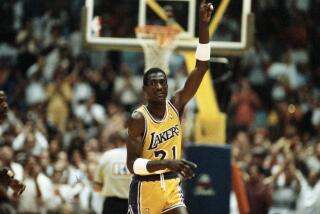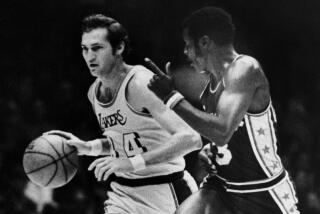Rick Barry: Once a Warrior, Always . . . : Former Golden State Star Hit His Shots and Received Quite a Few, Too
- Share via
The player who led the Golden State Warriors to the only NBA championship in their history will be sitting in the Oakland Coliseum Arena this afternoon when the Warriors and Lakers play the third game of their Western Conference semifinal series.
But ask Rick Barry if he feels any emotional link to his former team, and he shakes his head.
“I don’t think I severed the ties,” he said Friday. “I think they did. They basically wrote me off.”
Barry, 43, spoke barely above a whisper, not for dramatic effect but because his vocal cords are shot--an occupational hazard in his position as pro basketball analyst for cable station WTBS.
“I had a viral infection and shouldn’t have talked for a week,” he said. “It just kept getting worse and worse, and my vocal cords became inflamed and irritated.”
For about two weeks, Barry didn’t speak at all. He used a reporter’s notebook to scribble his feelings last Monday in Springfield, Mass., when he was inducted into the National Basketball Assn.’s Hall of Fame, in recognition of a career that spanned 10 years in the NBA and four in the American Basketball Assn.
The NBA’s Rookie of the Year in 1966, Barry went on to become an All-Star six times and the Most Valuable Player in the 1975 NBA finals, when Golden State swept the Washington Bullets in four straight games to win the title.
“I’m working with a voice specialist,” Barry said, “which should give me much better control and enhance my voice. I might even be able to sing in the shower.”
It was once said that Rick Barry was Larry Bird before there was a Larry Bird. He averaged 30 or more points a game in four seasons, was the finest passing forward the game had ever seen, and with his unorthodox underhand delivery became the league’s all-time best free-throw shooter with a career percentage of .900.
When Barry and two of his sons take their seats this afternoon, they can look to the north end of the arena and see the jerseys of three retired Warriors: Al Attles, Nate Thurmond and Tom Meschery.
No Warrior has worn Barry’s No. 24 since he left the team as a free agent in 1978--Barry suspects the team’s longtime trainer, Dick D’Oliva, would not tolerate anyone else putting it on. But neither have the Warriors put it on display, making it nearly as conspicuous by its absence.
Barry said he has heard that the team’s new owners, Jim Fitzgerald and Dan Finnane, plan to retire the jersey in a ceremony some time next season. Finnane, who picked up Thurmond’s expenses to act as Barry’s presenter in the Hall of Fame ceremonies, confirmed that the Warriors plan to honor him.
“But they wanted to wait one year to go by out of respect to Franklin (Mieuli),” Barry said. “Obviously, it was his wishes not to do that.”
There was a time when Barry’s uniform hung in Mieuli’s office for five years after Barry jumped to the ABA, such was his affection for Barry. But when Barry came back and left again--this time for the Houston Rockets because of a falling-out with then-coach Attles--Mieuli took it as a personal betrayal.
Nine years later, Mieuli--who sold the Warriors in 1986--still refuses to talk about a man he once treated as a son. Barry once telephoned about a job as coach--he was going to bring back ex-Warrior Clifford Ray as his assistant--but his calls were never returned.
“I don’t hold hard feelings toward the Warriors or Franklin Mieuli,” Barry said. “When I look back at it, I think of it as one of the wonderful experiences of my life, to have been there and won a championship.
“Those are the memories that I want to dwell on, not the last year when I saw things deteriorate.
” . . . It was Franklin and Al and nobody else, and there are a lot of reasons for that. What’s the sense of bringing it up now? It’s ancient history.”
What Rick Barry would like to do most, he said, is act.
“My height (6 feet 7 inches) is a problem,” he said. “But I’d even play a monster. James Arness started as ‘The Thing.’ ”
Barry as a monster? Some of those who played with and against Barry would call it typecasting.
“Half the players disliked Rick,” Billy Paultz, a friend and former teammate, once said of Barry. “The other half hated him.”
Barry was a perfectionist; he was arrogant, and his referee-baiting would make McEnroe a choirboy by comparison. He jumped leagues before it became fashionable to do so. He had an attitude .
One former Laker called Barry the greatest white player ever to perform in the NBA, but after Barry’s finest season--when the Warriors won the title--he finished fourth in voting for the league’s Most Valuable Player.
“Joke of the year,” Barry said. “I finished behind Bob McAdoo and Elvin Hayes. I played as well as I could play that year.”
He could never raise his game, however, to the point where people forgot what they didn’t like about Barry. But while he understands that now, Barry believes that people failed to distinguish between his on-court and off-court personas.
“I readily admit I was a fool on the court,” he said. “I was crazy.”
If there would be anything he’d do differently, Barry said, he wouldn’t be that crazy.
“If I could (I’d) control it,” he said. “Because it changed the entire perception of Rick Barry as a person.
” . . . Some things John Havlicek said to officials were so much worse than anything I said, but he got away with it.
“He didn’t have the look, the craziness, the gestures I had. And he was a Celtic.”
Even after he left the game in 1980, after two troubled and disappointing seasons with the Rockets, Barry’s reputation apparently followed him.
He was hired by CBS as a broadcaster but was dropped after one year. He was too negative, it was said, and too tough to work with. Despite his movie-star looks and household name, no one would hire Barry. He had one deal worked out with Seattle to broadcast SuperSonic games, but that fell through when the team would not allow his wife to travel with him.
It wasn’t until 1984 that he was picked up by WTBS.
“When CBS let me go, I was crushed,” he said Friday. “Life was going along wonderfully well, and all of a sudden there was this rude awakening.”
On the surface, it would appear that the past decade has been one endless rude awakening for Barry: The falling-out with Mieuli. The firing by CBS. The divorce from his first wife of 16 years, and his separation and pending divorce from his second wife.
Last year, Barry lost virtually all his money in the Technical Equities investment scandal. That’s one reason why, in addition to working at his broadcasting career, Barry recently took a part-time sales position with the Denver Nuggets.
“Basically, it’s like I’m starting over,” he said.
Barry lives in a rented townhouse in Colorado Springs and does not own a car, a departure from the days when he demanded a Porsche as part of his contract with the Warriors.
“Sure, I’d like to have a nice car,” he said, “but what people don’t understand is that there’s a big difference between having those things when you’re in a position to have them, and needing them. I don’t need them.”
Barry said there has not been a time in his life when he’s been happier.
“I’ve met another lady who’s been wonderful to me,” he said, “and despite my economic setbacks, there are so many other good things that have happened. I feel very fortunate.”
Rex Lardner, a vice president for sports at WTBS, calls Barry the best analyst in the game today.
“The people here love working with him,” Lardner said. “He’s a great worker and he does his homework. . . . And I think what has happened to him has humbled him a little bit. He’s more sensitive to everything than he was years ago.”
Barry acknowledges that he has changed, at least in some respects. His problems didn’t cause him to start drinking or taking drugs, or plunge him into depression, he said.
“I just want to be happy,” he said, “and in the last few years I’ve learned what it takes to make me happy.
“And I like myself. Acting lessons have helped me a lot in the last three or four years to help me like myself. You have to like yourself.”
And there’s not much he can do, he said, about those who don’t like him.
When one of Barry’s boys was little, he had a strong attachment to his blanket. He also was a big fan of Jamaal Wilkes, so Barry turned to his then teammate for help.
“Jamaal asked him for the blanket,” Barry said, “and I’ll be darned . . . he gave it to him. Jamaal hung it in his locker.”
Barry sees few of his former teammates now. But he said Friday that he’s considering playing in an old-timers’ game, something he would never have done in the past.
An avid tennis player, Barry is in exceptional shape, weighing 15 fewer pounds (205) than when he retired.
Recently, he picked up a basketball and made more than 90 free throws in a row. But an hour of shooting also left his shoulder sore.
“I’ve had a change of heart about the old-timers’ game,” he said. “I didn’t want to go out there and do something that I couldn’t do as well as I once did it. And I have a bad knee, and I didn’t want to abuse it.
“But then a friend talked to me and said how people would like to see me go out there and mess around.”
Didn’t he think that other great athletes shared a similar reluctance to possibly embarrass themselves in such games?
“Obviously not, judging by the way some of those guys looked out there. Did you see the shape some of them were in? You couldn’t pay me to go out there like that.
“Pride, I guess.”
More to Read
Go beyond the scoreboard
Get the latest on L.A.'s teams in the daily Sports Report newsletter.
You may occasionally receive promotional content from the Los Angeles Times.










